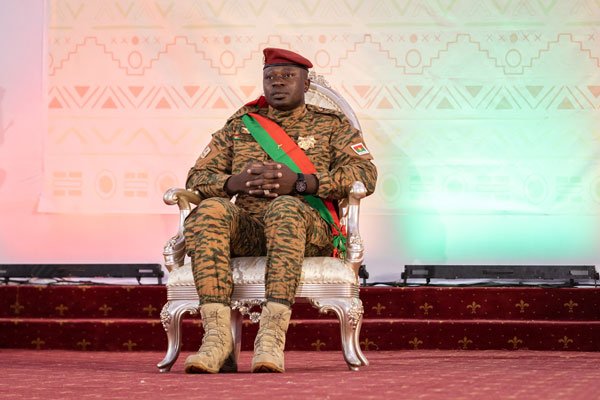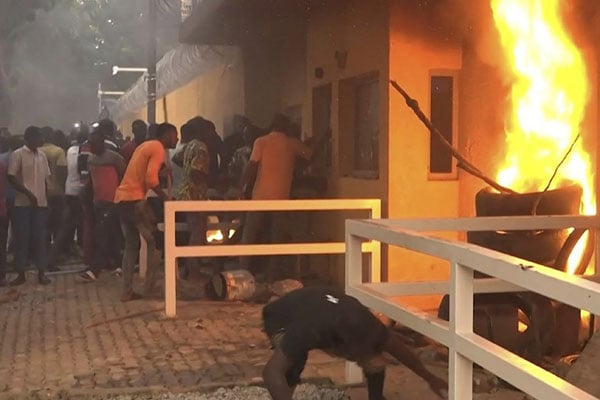Burkina junta leader resigns, flees after coup
Burkina Faso’s junta leader agreed to step down on Sunday, religious and community leaders said, two days after army officers announced his ouster in a coup that sparked internal unrest and international condemnation.
Lieutenant-Colonel Paul-Henri Sandaogo Damiba “himself offered his resignation in order to avoid confrontations with serious human and material consequences”, the religious and community leaders said in a statement.
It followed mediation between Damiba and the new self-proclaimed leader, Ibrahim Traore, by the religious and community leaders, they added.
Regional diplomatic sources said Damiba — who himself took power in a January putsch — had fled to Togo’s capital Lome on Sunday following the unstable and impoverished West African nation’s second coup this year.
Traore announced in the evening that he had received the support of army chiefs to “reinvigorate” the anti-jihadist struggle.
In a statement Sunday, the West African regional bloc ECOWAS welcomed that the various players in the Burkinabe drama had accepted “a peaceful settlement of their differences”. An ECOWAS delegation would travel to Ouagadougou Monday, the statement added.
Damiba set “seven conditions” for stepping down, the religious and community leaders said.
These included security guarantees for him and his allies in the military; and that the pledge he had given to West Africa’s regional bloc for a return to civilian rule within two years be respected.
The religious and community leaders — who are very influential in Burkina Faso — said that Traore, 34, had accepted the conditions and called for calm.
‘Disinformation campaign’
The putschists lifted an overnight curfew imposed Friday and reopened the country’s borders. It was on Friday that junior military officers announced they had toppled Damiba.
Kate Saturday Damiba had said he had no intention of giving up power, urging the officers to “come to their senses” amid a backdrop of protests.
But a statement issued on Sunday by the pro-Traore military said he would remain in charge “until the swearing-in of the president of Burkina Faso designated by the nation’s active forces”, at an unspecified date.
The officers had accused Damiba of having taken refuge at a military base of former colonial power France to plot a “counter-offensive”, charges he and France denied.
On Sunday, dozens of Traore’s supporters gathered at the French embassy in Ouagadougou.
Security forces fired tear gas from inside the compound to disperse the angry protesters after they set fire to barriers outside and lobbed rocks at the structure, some trying to scale the fence, according to an AFP reporter on the scene.
The French foreign ministry condemned the violence by “hostile demonstrators manipulated by a disinformation campaign against us”.
That incident followed a fire at the embassy on Saturday and a blaze in front of the French Institute in the western city of Bobo-Dioulasso.
A French institute in the capital also sustained major damage, the French foreign ministry said.
‘Burkina Faso needs peace’
Damiba came to power in the nation of 16 million people in a January coup, accusing elected president Roch Marc Christian Kabore of failing to beat back jihadist fighters.
But the insurgency has raged on and more than 40 percent of Burkina Faso remains outside government control.
Thousands have died and about two million have been displaced by the fighting since 2015, when the insurgency spread to Burkina Faso from neighbouring Mali.
The officers said it was Damiba’s failure to quell the jihadist attacks that had prompted them to act.
Friday’s events sparked a wave of international criticism, including from the United States, the African Union, the European Union and ECOWAS.
“Burkina Faso needs peace, stability and unity to fight terrorist groups and criminal networks operating in parts of the country,” said a statement by UN Secretary General Antonio Guterres.
Jihadist violence has also prompted a series of coups in Mali since 2020 and fuelled instability in neighbouring Niger.
The new self-proclaimed Burkina leaders had said they were willing “to go to other partners ready to help in the fight against terrorism”.
No country was explicitly mentioned but Russia, whose influence is growing in French-speaking Africa including Mali and the Central African Republic, is among the possible partners in question.
A few hours before events unfolded on Friday, hundreds of people had rallied in the capital seeking Damiba’s departure, the end of France’s military presence in the Sahel and military cooperation with Russia.



